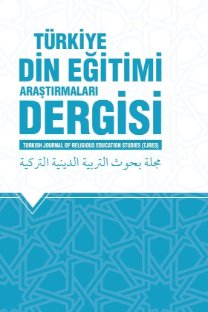TÜRKİYE GERÇEKLİĞİNDE SİVİL TOPLUM VE CEMAATLER
Bu araştırma modern bir kavram olan sivil toplum ile dini yapılanmaları temsil eden cemaat kavramı arasındaki ilişkiden yola çıkarak, bu kavramların sosyal hayattaki görünümleri ve yapısal durumlarını, ülkemiz gerçekliğinde incelemeyi amaçlamaktadır. Sivil toplum ve cemaat oluşumları arasındaki ilişkinin neliği ve yönünün tespitinden sonra, tüm toplum yapılarında olduğu gibi ülkemizde görülen cemaatlerin bugün karşılaştıkları bir takım sosyo-kültürel, sosyo-ekonomik ve dini sorunların yarına nasıl evrilebileceğini belirlemek ve çözüm önerileri sunmak bu araştırmanın bir başka temel amacıdır. Araştırmada birey-toplum ve devlet ilişkilerinde önemli role sahip olan sivil toplum ve cemaatler olgusu; kavramsal, kültürel, siyasi, sosyal ve tarihi perspektifler göz önünde bulundurularak açıklanmıştır. Araştırma neticesinde ülkemizde cemaatler üzerinden doğabilecek bazı sorunların olduğu ve bundan sonraki süreçte cemaatlerin ve dini grupların birbirleriyle ciddi sorunlar yaşayabileceği, galibinin olmayacağı bu süreçte, bundan tüm toplumun olumsuz yönde etkilenebileceği tespit edilmiştir.
Anahtar Kelimeler:
Sivil toplum, cemaat, dini gruplar, modernleşme, sekülerizm
CIVIL SOCIETY AND JAMĀʽAH IN THE REALITY OF TURKEY
This study aims at investigating two distinct concepts, that is the modern concept of civil society on the one hand, and the concept of jamāʽah (religious community) which constitutes religious structures on the other, their manifestations and structural states in social life, in the context of today’s Turkey. After determining the character of the relation of these two concepts and its direction, one other chief objective of this study is to propose a solution in regard to some of the existing socio-cultural, socio-economic and religious challenges of the religious communities present in Turkey today, and ultimately to try to assess their future evolution. Also, the cases of civil society and religious community, as an important factor in citizen/society-state interactions, will be explained in the light of all of their conceptual, cultural, political, social and historical aspects. As a final outcome of this study, it has been concluded that existing religious communities and groups are harbouring some serious problems within their organization, and that the possibility of the conflict between the interests of different religious communities should be taken into account, especially because of its potential negative impact on the society as a whole.
Keywords:
Civil society, jamāʽah, religious groups, modernization, secularism,
___
- Hâkim, N.âbûrî (1990). el-Müstedrek. Mustafa Abdulkadir Atâ (nşr.). (C.4). Beyrut.
- İbn Abidîn, M. E. (1992). Reddü’l-muhtar. (C.4), Beyrut.
- İbn Ebi’l-‘İzz, el-Hanefi (1997). Şerhu’l-‘Akîdeti’t-Tahaviye. (C. 2), Beyrut.
- İbn Hanbel, Ebû Abdillah Ahmed b. Muhammed eş-Şeybânî. (1313). Müsnedü Ahmed b. Hanbel. Şu‘ayb el-Arnaût vd. (nşr). (C.3), Kahire.
- Köse, S. (2003). İslam hukuku açısından din ve vicdan özgürlüğü. İstanbul.
- Köse, S. (2013). Kardeşlik hukuku. Kutlu Doğum Haftası Sempozyum (21-22 Nisan 2012) Bildiriler Kitabı içinde. (ss. 123-148), Ankara.
- Ma‘mer b. Râşid. (1983). el-Câmi‘ el-Musannef içinde. Habibürrahman el-A‘zamî (nşr). (C.11). Beyrut.
- Müslim, Ebu'l-Huseyn Müslim b. Haccâc el-Kuşeyrî. (1992). es-Sahîh. İstanbul: Çağrı.
- Nesai, Ebû Abdirrahman Ahmed b. Şuayb. (1992). es-Sünen. İstanbul: Çağrı.
- el-İsfahânî, R. (2007). ez-Zerîa ila Mekârimi’ş Şerî’a. Kahire: Daru’s-Selam.
- Tirmizî, Ebû İsa Muhammed b. İsa b. Sevre es-Sülemî. (1978). el-Câmi‘u’s-sahîh/Sünenü’t-Tirmizi. Ahmed Muhammed Şakir (thk &şerh). Kahire.
- ISSN: 2149-9845
- Başlangıç: 2016
- Yayıncı: Mehmet BAHÇEKAPILI
Sayıdaki Diğer Makaleler
İhvan-ı Safa’nın İnsan Tasavvurunda Bilgi-Ahlak-İman İlişkisi
Le mois le plus long: Ramadan & Istanbul
TÜRKİYE GERÇEKLİĞİNDE SİVİL TOPLUM VE CEMAATLER
İNANÇSIZLIK NEDİR? İNANÇSIZLIK KAVRAMI ÜZERİNE EMPRİK BİR ARAŞTIRMA
Kenan SEVİNÇ, Tuğba METİNYURT, Thomas J. COLEMAN
Le mois le plus long: Ramadan & Istanbul
DÖRT MEZHEP İMAMININ OTORİTESİNİ TESİS EDEN TEMEL UNSURLAR -GÜVEN-OTORİTE İLİŞKİSİNE DAİR BİR ANALİZ
ŞİÎ MÜFESSİR AYYÂŞÎ'NİN TEFSİRİNDE ZAYIF HADİS
